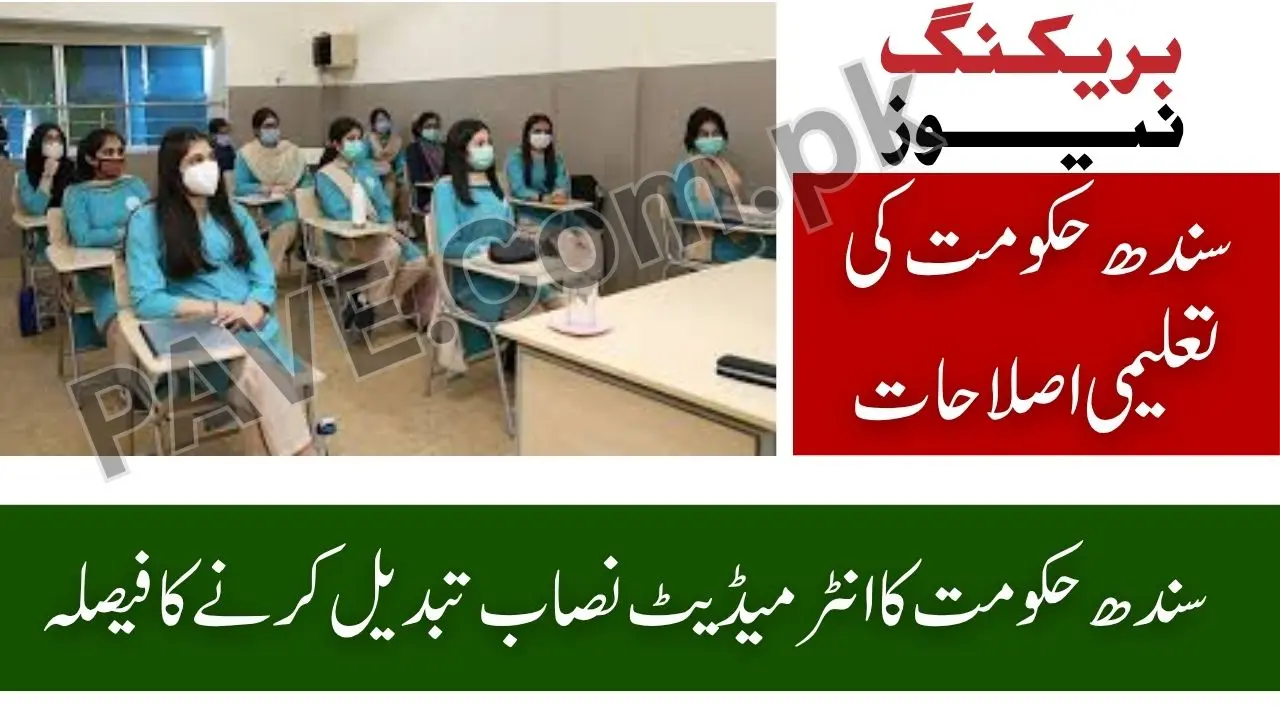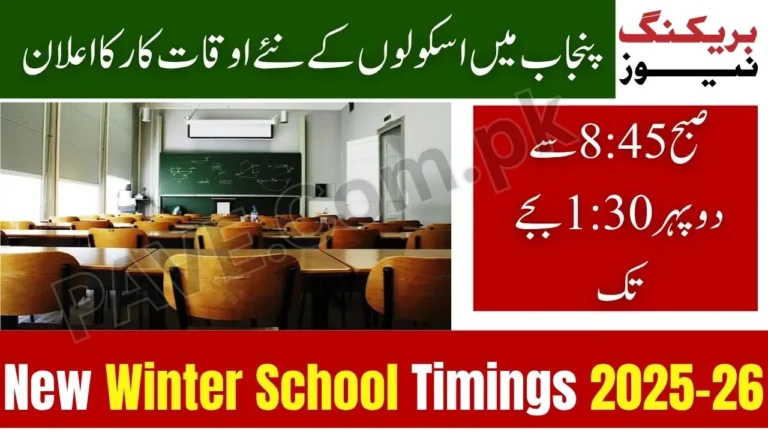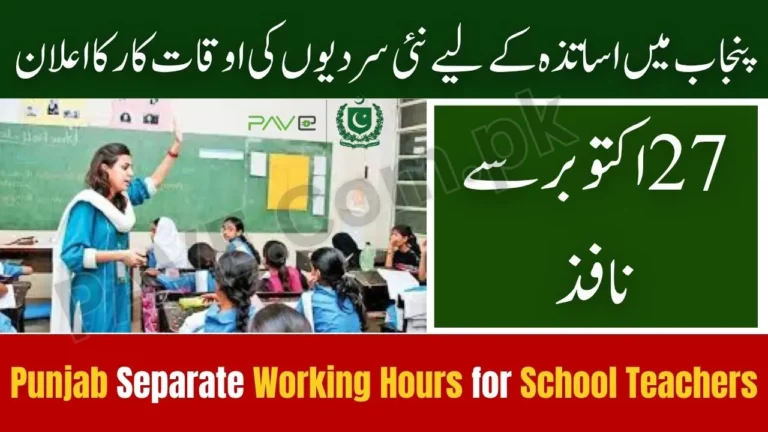Breaking News: Sindh to Change Intermediate Syllabus and Launch Daily Library Classes 2025
Sindh to Change Intermediate Syllabus — The Sindh government has announced a comprehensive education reform aimed at modernizing the intermediate curriculum and introducing daily library classes in all public sector colleges across the Hyderabad region. This initiative is part of a broader plan to rebuild the reading culture among students and align education standards with modern academic and professional needs.
The decision was taken in a high-level meeting chaired by Colleges Secretary Nadeem-ur-Rehman Memon, attended by Director General Colleges Navaid Rab Siddiqui, Regional Director Colleges Hyderabad Mustafa Kamal, and principals of various government colleges. Officials agreed that the existing syllabus has become outdated and requires an overhaul to prepare students for higher education and competitive careers.
According to the plan, daily library sessions will be introduced to help students develop comprehension, research, and analytical skills. These sessions will encourage students to read regularly, explore beyond textbooks, and enhance their overall intellectual capacity. The reform marks a turning point for Sindh’s education system, particularly for over 100,000 students enrolled in 72 colleges across the Hyderabad region.
Sindh Intermediate Syllabus Change 2025 — A Move Toward Modern Education
The major education reform in Sindh was finalized during a high-level meeting chaired by Colleges Secretary Nadeem-ur-Rehman Memon. The meeting was attended by DG Colleges Navaid Rab Siddiqui, Regional Director Colleges Hyderabad Mustafa Kamal, and several college principals.
During the discussion, the officials agreed that the current Intermediate curriculum no longer aligns with modern academic standards or employment market needs. Hence, the Sindh Education Department will develop a new syllabus focusing on creativity, research, and practical knowledge.
“Our goal is to make Sindh’s college education globally competitive and intellectually stimulating,” stated Secretary Memon.
Daily Library Classes — Reviving Reading Culture in Sindh Colleges
As part of the reform, every government college in Hyderabad will introduce daily library sessions. These sessions will provide students a dedicated hour for reading newspapers, books, journals, and research material.
Key Objectives of Daily Library Classes:
- Encourage reading habits among students.
- Improve comprehension, research, and writing skills.
- Build vocabulary and critical thinking ability.
- Shift focus from rote learning to conceptual understanding.
Teachers and librarians will collaborate to supervise these reading sessions, ensuring that students make meaningful use of library resources.
Over 100,000 Students to Benefit from Sindh Education Reform 2025
According to the Colleges Department, nearly 104,326 students are currently studying in 72 government colleges across the Hyderabad region. All of them will benefit from this reform.
The government believes that these steps will raise the standard of education, particularly in rural and semi-urban areas, and create equal opportunities for all students.
Districts including Tando Allahyar, Jamshoro, Badin, and Dadu will also be part of this educational overhaul, ensuring widespread benefits across Sindh.
Restoration of Rain-Damaged Colleges in Sindh
During the meeting, Secretary Nadeem-ur-Rehman Memon directed the Education Works Department to accelerate the repair and renovation of rain-damaged colleges. Many colleges in the Hyderabad region suffered during recent monsoon rains.
Restoration Plan Includes:
- Reconstruction of classrooms and laboratories.
- Repair of boundary walls and sanitation systems.
- Installation of modern furniture and smart learning equipment.
- Upgradation of electricity and water supply.
The secretary stressed that infrastructure issues should not hinder students’ education, adding that “no student should face difficulty due to a neglected college building.”
Check Also: Breaking News: Govt Announces Cheaper Electricity for Industrial and Agricultural Sectors for Next 3 Years
Sindh College Sports & Co-Curricular Revival 2025
Recognizing the importance of physical and creative activities, the Sindh Education Department also announced the revival of sports and co-curricular programs.
An Inter-College Sports Week will be held in December 2025, featuring events such as:
- Cricket and football tournaments
- Quiz and debate competitions
- Cultural performances
- Award ceremonies for outstanding students
These activities aim to promote teamwork, discipline, and self-confidence among students, complementing the academic reforms.
Sindh Curriculum Update 2025 — Aligning with Global Standards
The upcoming Sindh Intermediate syllabus update will focus on competency-based education, replacing outdated content with modern topics relevant to today’s world.
Key Areas of Focus:
- STEM Education: Strengthening science, technology, engineering, and mathematics concepts.
- Digital Skills: Training students in computer literacy, online research, and e-learning.
- Environmental Awareness: Adding lessons on sustainability and climate responsibility.
- Practical Learning: Including entrepreneurship, innovation, and civic studies.
Officials revealed that the Sindh Textbook Board will collaborate with universities and education experts to design the new curriculum.
Check Also: How to Get a Scotland Work Visa in 2025 – Step-by-Step Guide for Pakistanis
Teacher Training Programs for Sindh Intermediate Syllabus Change
The new syllabus will introduce a modern teaching methodology, requiring educators to adapt to fresh learning tools. To ensure smooth implementation, the DG Colleges Office will start teacher training workshops across Sindh.
Training Modules Will Cover:
- Interactive classroom teaching techniques.
- Use of multimedia and digital tools.
- Student motivation and communication skills.
- Managing and promoting library-based learning.
The aim is to prepare teachers for smart learning environments that align with Sindh’s modern education goals.
Check Also: Breaking News: Virat Kohli Duck Record Shocks Fans in 2025
Hyderabad Region to Pilot Sindh Education Reform
The Hyderabad region will serve as the pilot zone for the Sindh Intermediate Syllabus Change 2025. After successful execution, the model will be replicated across Karachi, Sukkur, Larkana, and Mirpurkhas divisions.
This phased approach ensures that the system is tested, refined, and improved before expanding province-wide.
Implementation Timeline of Sindh Intermediate Syllabus 2025
| Phase | Key Activity | Duration |
|---|---|---|
| Phase 1 | Syllabus drafting & stakeholder review | Nov 2025 – Mar 2026 |
| Phase 2 | Teacher training & college restoration | Apr – Jul 2026 |
| Phase 3 | Implementation of new syllabus & daily library sessions | Aug 2026 |
| Phase 4 | Province-wide expansion & monitoring | Jan 2027 onward |
This timeline reflects the government’s commitment to structured and result-oriented reform.
Sindh Government’s Vision for a Modern Education System
The Sindh government’s education vision focuses on quality, inclusion, and digital transformation. By reforming the intermediate level, it aims to:
- End reliance on outdated textbooks.
- Introduce creative, research-driven education.
- Bridge the digital divide between rural and urban institutions.
- Strengthen students’ employability and higher education readiness.
The plan is fully aligned with Pakistan’s Vision 2030 for inclusive and sustainable education.
Expected Benefits of Sindh Intermediate Education Reforms
Experts believe that the Sindh Intermediate syllabus change and library classes will have far-reaching benefits:
- Better student performance in exams.
- Improved analytical and communication skills.
- Higher enrollment and reduced dropout rates.
- Enhanced college rankings across Sindh.
- Greater participation in cultural and sports activities.
Educationists see this as a revolutionary step in transforming Sindh’s education landscape.
Expert Opinions on Sindh Education Reform 2025
“Introducing library sessions is a brilliant move,” said Professor Arif Jamal, senior educationist.
“It revives the habit of reading and helps students think independently — a skill our system has long neglected.”
He further suggested that other provinces like Punjab and Balochistan should follow Sindh’s example in modernizing intermediate education.
Check Also: Breaking: Punjab Launches Teacher Verification Program 2025 Under PECTAA
Conclusion — Sindh to Change Intermediate Syllabus
The Sindh government’s decision to change the Intermediate syllabus and launch daily library classes signals a new era for provincial education. By merging modern curriculum, teacher training, infrastructure renewal, and co-curricular revival, the government is steering the system toward creativity, inclusivity, and progress.
Over 100,000 students in the Hyderabad region will directly benefit from these reforms, paving the way for a modern, research-oriented education culture in Sindh.







